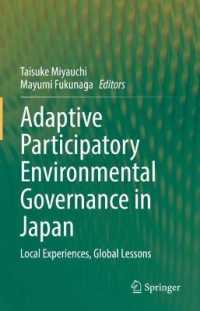内容紹介
自然資源管理、里山保全活動、森林のリクリエーション利用、農業用水、生物多様性保全、獣害対策、福島原発事故、再生可能エネルギー、流域連携、気候変動などの豊富な事例から、ボトムアップで順応的な環境ガバナンスのあり方を論じた本です。科学的見地にもとづき住民中心に合意形成しながら進めていく、という環境ガバナンスの「正しい解」は、必ずしも現実にうまく行くとは限りません。「やっかいな問題」としての環境問題をどう解決すればよいのか、現場から積み上げた理論の本です。
著者からのコメント
本を作ることはいつもエキサイティングないとなみですが、英語の本を作るということはなかなかやっかいかつエキサイティングないとなみでした。この本は、現場から議論を組み立て問題解決に寄与しようとする、日本の環境社会学のすぐれた研究と実践を英語で伝えたく作った本です。あえて日本の事例に絞った上で、各執筆者が現場で苦闘しながら理論化したものを16章、揃えました。いつも議論をたたかわせている環境社会学の研究仲間だからこそ、事例の多様さと裏腹に、共通するテーマ-順応性、不確実性、正当性、多元的価値、社会生態システム、合意形成、社会的受容、学び、語り(ナラティブ)など-について本全体を通して論じることができました。
〔出版社〕Springerの紹介ページ


